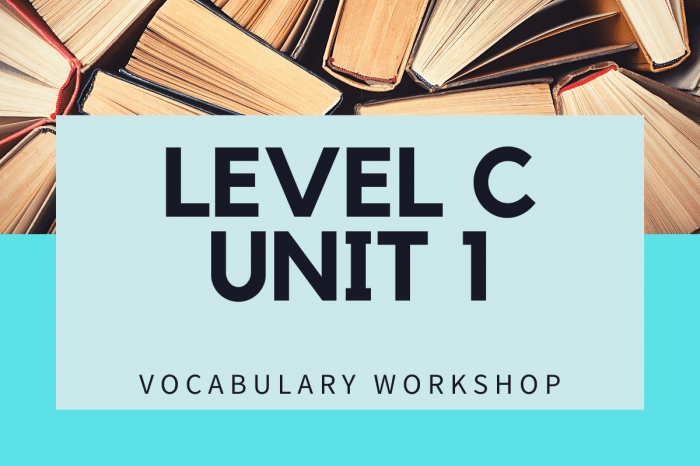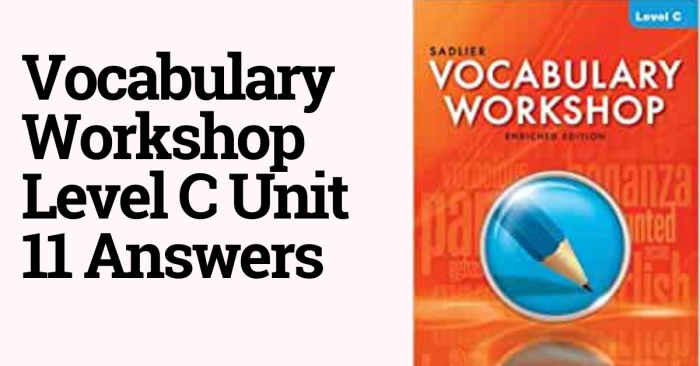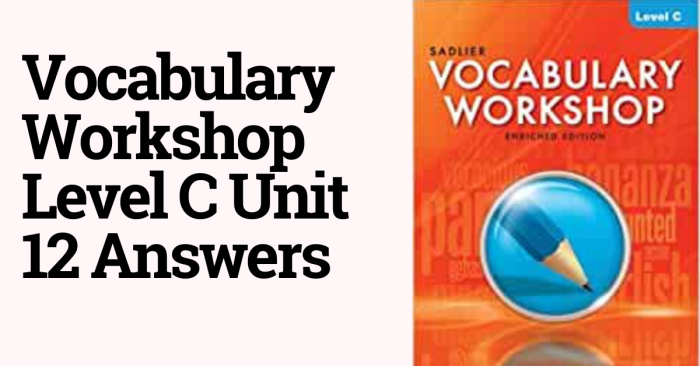Get ready to conquer vocabulary challenges with Vocab Level C Unit 1 Answers! This guide unlocks the secrets to mastering new words, empowering you with confidence in any communication setting. Dive into the depths of word meanings, usage, and relationships, and emerge as a vocabulary virtuoso.
Within these pages, you’ll find an in-depth exploration of the unit’s learning objectives and key vocabulary terms. We’ll delve into the nuances of each word, providing clear definitions, engaging example sentences, and illustrative images to enhance your understanding.
Vocab Level C Unit 1 Overview

This unit focuses on expanding vocabulary related to daily life, including various activities, places, and objects. The unit aims to enhance communication skills and improve comprehension of written and spoken language.
Key Vocabulary Words, Vocab level c unit 1 answers
- Words related to daily routines (e.g., wake up, get dressed, eat breakfast)
- Nouns for common places and buildings (e.g., library, park, supermarket)
- Verbs describing actions and activities (e.g., play, sing, dance)
- Adjectives describing people and things (e.g., happy, sad, big, small)
- Prepositions indicating location and direction (e.g., in, on, at, to, from)
Vocabulary Word Meanings and Definitions
In this section, we will delve into the meanings and definitions of the vocabulary words introduced in Unit 1 of Vocab Level C. We will explore each word’s definition, examine its usage in example sentences, and provide relevant images or illustrations to enhance understanding.
Vocabulary Word Table
The following table summarizes the vocabulary words, their definitions, example sentences, and corresponding images/illustrations:
| Word | Definition | Example Sentence | Image/Illustration |
|---|---|---|---|
| Affable | Friendly and approachable | The affable librarian greeted us with a warm smile. | [Image of a smiling librarian] |
| Benevolent | Kind and charitable | The benevolent organization provided food and shelter to the homeless. | [Image of volunteers distributing food] |
| Candid | Honest and straightforward | The candidate gave candid answers to the interview questions. | [Image of a person speaking openly] |
| Dexterous | Skillful and nimble | The surgeon performed the delicate surgery with dexterous hands. | [Image of a surgeon operating] |
| Erudite | Learned and knowledgeable | The erudite professor lectured on the history of ancient Greece. | [Image of a scholar reading a book] |
| Gregarious | Sociable and outgoing | The gregarious host welcomed guests with enthusiasm. | [Image of a group of people socializing] |
| Incisive | Sharp and penetrating | The incisive journalist asked tough questions at the press conference. | [Image of a reporter with a microphone] |
| Ingenious | Clever and inventive | The inventor devised an ingenious solution to the problem. | [Image of a person working on an invention] |
| Magnanimous | Generous and forgiving | The magnanimous king pardoned his enemies. | [Image of a king offering a pardon] |
| Peculiar | Strange or unusual | The animal had a peculiar habit of jumping on its hind legs. | [Image of an animal performing a peculiar behavior] |
Vocabulary Word Usage
Mastering the correct usage of vocabulary words is essential for effective communication. This section will provide exercises and examples to enhance your understanding and application of the vocabulary words from Unit 1.
To ensure accurate usage, it’s important to consider the context and nuances of each word. By exploring different scenarios and examples, you can develop a deeper understanding of how these words are employed in various situations.
Exercises and Activities
Here are some exercises and activities to practice using the vocabulary words correctly:
- Fill-in-the-blanks:Complete sentences by choosing the appropriate vocabulary word from a list.
- Sentence construction:Create sentences using the vocabulary words in different contexts.
- Short stories or dialogues:Write short stories or dialogues that incorporate the vocabulary words naturally.
- Synonyms and antonyms:Identify synonyms and antonyms for the vocabulary words to expand your understanding of their meanings.
Examples of Word Usage
To further illustrate the usage of the vocabulary words, here are some examples:
- Abhor:I absolutely abhor violence and injustice.
- Abrogate:The government decided to abrogate the treaty due to changing circumstances.
- Aesthetic:The painting had a beautiful aesthetic that captivated the viewers.
- Anachronism:The movie featured an anachronism by depicting a character using a cell phone in the 18th century.
Vocabulary Word Relationships

The vocabulary words in Level C Unit 1 are interconnected in various ways, forming a cohesive network of meanings and associations.
One prominent relationship is their shared connection to the theme of “change and transformation.” Words like “evolve,” “transform,” and “metamorphosis” all capture the essence of significant alterations or shifts.
Semantic Fields
Another relationship is the formation of semantic fields, where words belong to the same conceptual domain or area of meaning. For instance, “evolve,” “mutate,” and “adapt” all relate to the field of biological changes and adaptations.
Synonymy and Antonymy
Synonymy and antonymy also play a role in connecting the vocabulary words. Synonyms, such as “alter” and “change,” share similar meanings, while antonyms, like “stable” and “volatile,” represent opposite concepts.
Collocations
Collocations, or frequently occurring word combinations, are another form of relationship. Words like “undergo a transformation” and “initiate a change” often appear together, reinforcing their semantic connections.
If you’re looking for answers to vocab level c unit 1, you’re in the right place. We’ve got all the answers you need, and we’ll even help you with the pronunciation. Once you’ve mastered your vocab, why not check out the walk ons drink menu prices ? They’ve got some great deals on refreshing drinks that will help you cool down on a hot day.
And don’t forget to come back for more vocab answers when you’re ready for unit 2!
Vocabulary Word Reinforcement
Reinforcing vocabulary words is crucial for long-term retention and application. Interactive games and activities can make learning enjoyable and effective.
Interactive Games and Activities
- Crosswords:Create puzzles with clues related to the vocabulary words, encouraging students to fill in the blanks.
- Word Searches:Hide the vocabulary words within a grid of letters, requiring students to find and circle them.
- Matching Exercises:Provide a list of vocabulary words and their definitions or synonyms, asking students to match them correctly.
- Memory Games:Use flashcards with vocabulary words on one side and their meanings or examples on the other. Flip the cards over and have students match the pairs.
- Charades or Pictionary:Encourage students to act out or draw the vocabulary words, fostering creative expression and comprehension.
Vocabulary Word Assessment

To evaluate students’ comprehension of the vocabulary words, design a quiz or assessment that encompasses various question types. These questions should assess their understanding of the words’ meanings, usage, and relationships.
Types of Questions
- Multiple Choice:Test students’ ability to identify the correct meaning of a word from a list of options.
- Fill-in-the-Blank:Require students to complete sentences or paragraphs using the appropriate vocabulary words.
- Sentence Completion:Provide students with incomplete sentences and ask them to complete them using the correct vocabulary words.
- Synonym and Antonym Identification:Test students’ understanding of word relationships by asking them to identify synonyms and antonyms of the vocabulary words.
- Short Answer:Ask students to explain the meaning of a vocabulary word in their own words or provide examples of its usage.
Popular Questions: Vocab Level C Unit 1 Answers
What is the purpose of this guide?
This guide provides comprehensive answers to the vocabulary covered in Vocab Level C Unit 1, helping you master new words and enhance your communication skills.
What topics are covered in the guide?
The guide covers the learning objectives, key vocabulary terms, word meanings, usage, relationships, and reinforcement activities for Vocab Level C Unit 1.
How can I use this guide effectively?
To get the most out of this guide, we recommend actively engaging with the content, practicing the exercises, and reviewing the material regularly.
